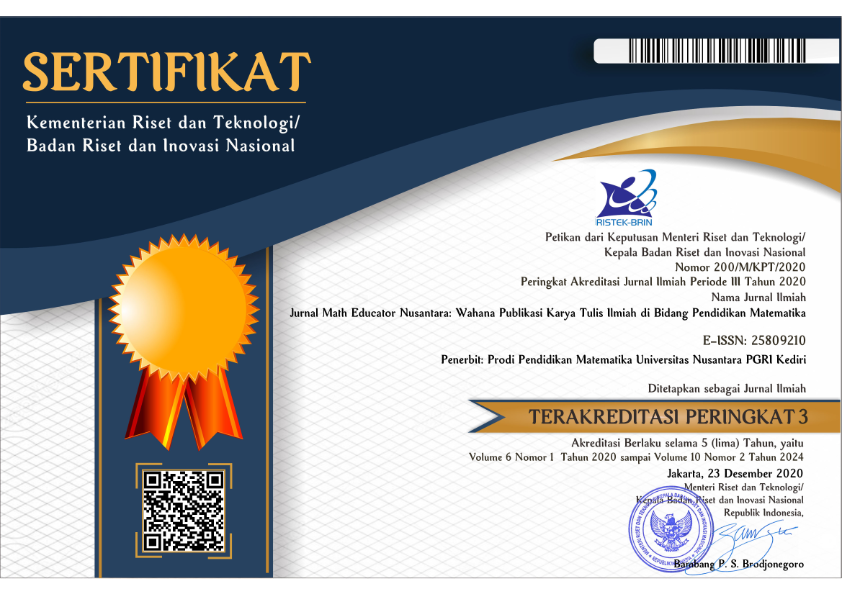Pengembangan Perangkat Pembelajaran Matematika Dengan Pendekatan Saintifik Berbasis GeoGebra Untuk SMA di Mataram
DOI:
https://doi.org/10.29407/jmen.v4i2.12526Keywords:
pengembangan perangkat pembelajaran, pendekatan saintifik, GeoGebraAbstract
Abstrak: Pengajaran matematika di kota Mataram dominan masih terpusat pada guru, partisipasi siswa dalam pembelajaran dan hasil belajar siswa masih rendah yang salah satunya disebabkan kurangnya pemahaman siswa terhadap materi yang diajarkan. Mengatasi hal tersebut, diperlukan suatu pembelajaran yang berpusat pada siswa serta dapat mengkonstruksi pemahaman siswa. Untuk itu dalam penelitian ini dikembangkan perangkat pembelajaran matematika melalui pendekatan saintifik berbasis GeoGebra berupa RPP, Buku Guru dan LKS yang valid, praktif dan efektif. Hasil validasi perangkat: RPP (4.55), Buku Guru (4.17), LKS (4.44). Analisis efektifitas termasuk kategori efektif dimana: 1) Nilai siswa di atas KKM sebesar 86.84 % ; 2) Rata-rata aktivitas guru dan siswa berada pada rentang batas toleransi yang ditentukan; 3) Kemampuan guru mengelola pembelajaran berkategori baik; 4) Rata-rata respon positif siswa yaitu 92.65%. Serta berkategori praktis dengan kriteria: 1) Memiliki nilai IP baik; 2) Keterlaksanaan pembelajaran berkategori tinggi dengan nilai rata-rata 4.34; 3) Kemampuan guru mengelola pembelajaran berkategori baik. Dapat disimpulkan bahwa perangkat pembelajaran yang dikembangkan valid, praktis dan efektif sehingga dapat digunakan dalam pembelajaran di kelas.
Kata Kunci: pengembangan, perangkat pembelajaran, pendekatan saintifik, GeoGebra
Abstract : Teaching mathematics in Mataram City is still dominant by learning teacher-centered, the student participation in learning and students’ mathematics achievement are still low. One of which is due to a lack of students' understanding of the material being taught. Overcoming this, we need a student-centered learning and can construct students' understanding. For this reason, this study aim to develop a mathematical learning kit through a scientific approach based GeoGebra including the lesson plan (RPP), Teacher's Books and worksheets (LKS) that were valid, practive and effective. The result of the research show that the validation average score for : RPP (4.55), Teacher's Book (4.17), LKS (4.44). Effectiveness analysis included effective categories where : 1) Student scores above KKM were 86.84%; 2) The average activity of teachers and students is within the specified tolerance range; 3) The ability of teachers to manage learning in good category; 4) The average of students positive response is 92.65%. As well as practical categories with criteria: 1) Having a good IP value; 2) Implementation of high category learning with an average value of 4.34; 3) The ability of teachers to manage learning in good category. Thus, this research can be concluded that learning kit that are developed are valid, practical and effective so they can be used in classroom learning.
Key words : development, teaching kit, scientific approach, GeoGebra
References
Hohenwarter, M., & Lavicza, Z. (2009). The strength of the community : how GeoGebra can inspire technology integration in mathematics teaching. MSOR Connections, 9(2), 3–5. https://doi.org/10.11120/msor.2009.09020003
Hutkemri, & Zamri, S. N. A. S. (2016). Effectiveness of Geogebra on Academic and Conceptual Knowledge : Role of Students’ Procedural Knowledge as a Mediator. The New Educational Review, 44(2), 153–164. https://doi.org/10.15804/tner.2016.44.2.12
Juan, K. (2015). Effects of Interactive Software on Student Achievement and Engagement in Four Secondary School Geometry Classes, Compared to Two Classes With No Technology Integration. ProQuest Dissertations and Theses. University Of Florida.
Kim, V. (2015). Students’ Cognitive Processes In Mathematics Classroom Using Lesson Study And Open Approach With GeoGebra, (September). https://doi.org/10.13140/RG.2.1.1725.7041
Öçal, M. F. (2017). Asymptote Misconception on Graphing Functions: Does Graphing Software Resolve It? Malaysian Online Journal of Educational Technology, 5(1), 21–33.
Rochmad, R. (2012). Desain Model Pengembangan Perangkat Pembelajaran Matematika. Jurnal Kreano, 3(1), 59–72.
Santrok, J. W. (2013). Psikologi Pendidikan (2nd ed.). Jakarta: Kencana.
Seloraji, P. dan L. K. E. (2017). Students’ Performance in Geometrical Reflection Using GeoGebra. Malaysian Online Journal of Educational Technology, 5(1), 65–77.
Sipos, E. R. (2009). Teaching Geometry Using Computer Visualizations. Teaching Mathematics and Computer Science, 7(2), 259–277.
Tsitsia, B. Y. (2014). The Effects Of The Use Of Computers On Students’ Learning Of Trigonometry In Mathematics In Selected Senior High Schools In Ho Municipality. University Of Cape Coas.
Yildiz, A. (2016). The Geometric Construction Abilities of Gifted Students in Solving Real-World Problems: A Case from Turkey. Malaysian Online Journal of Educational Technology, 4(4), 53–67.
Downloads
Published
Issue
Section
License
Authors who publish with this journal agree to the following terms:
- Copyright on any article is retained by the author(s).
- The author grants the journal, the right of first publication with the work simultaneously licensed under a Creative Commons Attribution License that allows others to share the work with an acknowledgment of the work’s authorship and initial publication in this journal.
- Authors are able to enter into separate, additional contractual arrangements for the non-exclusive distribution of the journal’s published version of the work (e.g., post it to an institutional repository or publish it in a book), with an acknowledgment of its initial publication in this journal.
- Authors are permitted and encouraged to post their work online (e.g., in institutional repositories or on their website) prior to and during the submission process, as it can lead to productive exchanges, as well as earlier and greater citation of published work.
- The article and any associated published material is distributed under the Creative Commons Attribution-ShareAlike 4.0 International License
















